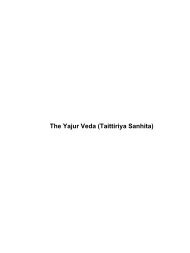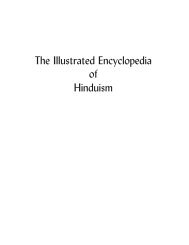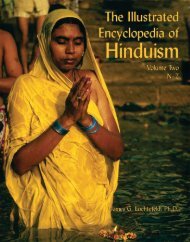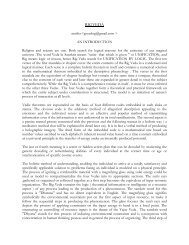A Concise Encyclopedia of Hinduism Klaus K Klostermaie
You also want an ePaper? Increase the reach of your titles
YUMPU automatically turns print PDFs into web optimized ePapers that Google loves.
67 experience<br />
variety <strong>of</strong> images and notions: in the<br />
Veda INDRA represents ‘good’, VØTRA<br />
‘evil’; the DEVAS are opposed by the<br />
ASURAS; the Äryas fight the DAITYAS. In<br />
the Puräæas Vi•æu appears in a series <strong>of</strong><br />
AVATÄRAS to combat evil: NÄRASIMḤA<br />
kills HIRAŒYAKAŸIPU to save PRAHLÄDA;<br />
Kø•æa kills KAߟA to save his people in<br />
Vraja; Räma kills RAVAŒA. Ÿiva drinks<br />
the poison HALÄHALÄ to save humankind.<br />
Durgä kills the buffalo demon to<br />
save the three worlds from demon rule.<br />
On the level <strong>of</strong> ethics the opposition<br />
between good and evil is manifested in<br />
following/not following the duties<br />
imposed by one’s VARŒA, and in the sets<br />
<strong>of</strong> virtues/vices developed especially by<br />
the Nyayaikas (see NYÄYA). True to the<br />
holistic bent <strong>of</strong> Hindu thought, however,<br />
the opposition between good and<br />
evil is not seen as a metaphysical split in<br />
reality: the categories good/evil are<br />
within the realm <strong>of</strong> dvandvas, pairs <strong>of</strong><br />
opposites in the finite sphere, ultimately<br />
to be overcome. <strong>Hinduism</strong> does not<br />
acknowledge an eternal hell or eternal<br />
damnation as punishment for evil<br />
actions. Even the demons are eventually<br />
saved from their evil nature, after having<br />
served a cosmic purpose.<br />
experience<br />
Hindus have always endeavoured to<br />
experience the ultimate rather than conceptualize<br />
it. Upani•adic techniques aim<br />
at an experience <strong>of</strong> the oneness <strong>of</strong><br />
ÄTMAN, and BRAHMAN and Vedäntic<br />
teachers amplify and refine these methods.<br />
ŸA¢KARA (2) insists that anubhava<br />
(experience), rather than intellectual<br />
understanding, can bring about LIBERA-<br />
TION. Theistic Hindu traditions aim at<br />
SÄKÆÄTKÄRA (a direct visual experience<br />
<strong>of</strong> God), which many Hindus claim to<br />
have had.


















